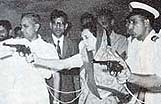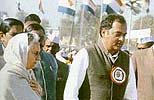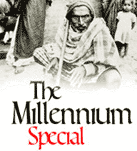Ten Indian flaws bequeathed by history
India does not have anything much to celebrate at the turn of the millennium. In politics the standards have fallen abysmally since the first couple of decades of Independence. There are now more adult illiterates (some 270 million) and more poor people (about 350 million) in India than ever before. In the Human Development Index published by the UNDP in 1995, India ranked 134 in the list of 174 countries studied.
Indian politicians smugly attribute all the ills of contemporary India to colonial exploitation, and promise to restore the nation to its imagined glorious state before the British conquest. This is sheer fantasy. Conditions in India at the time of the British conquest, far from being glorious, were in fact wretched and chaotic. And one of the most disturbing developments in India today is that in some respects, especially in politics, we have reverted to the dismal practices of the medieval world. Consider the following:
1. Disintegration of the Mughal Empire
 In the eighteenth century, on the eve of the British conquest, the Mughal empire was rapidly disintegrating. It was a time of endless wars between the fragments into which the empire had broken, and between them and foreign powers. For the common people, who were already living in a state of abject poverty, life now became truly hellish. Brigands freely roamed the land. And there was not much difference between brigands and rulers, for most of our kings, Muslim as well as Hindu, were inhumanly exploitative.
In the eighteenth century, on the eve of the British conquest, the Mughal empire was rapidly disintegrating. It was a time of endless wars between the fragments into which the empire had broken, and between them and foreign powers. For the common people, who were already living in a state of abject poverty, life now became truly hellish. Brigands freely roamed the land. And there was not much difference between brigands and rulers, for most of our kings, Muslim as well as Hindu, were inhumanly exploitative.
There was no peace, no security of life and property. Famine and pestilence periodically swept the land, devouring hundreds of thousands of people, sometimes forcing men even into cannibalism. The state of culture in India was dismal -- Hindu civilisation had been moribund for centuries; Muslim civilisation was hardly better. There was no progress in science and technology, or in any other field of learning. In agriculture and industry, our production methods were antiquated; in trade, our practices were remarkable only for their deviousness.
2. Modernisation of India
 In contrast, Europe, which had emerged from the Dark Ages, was rapidly progressing in every facet of life. This progress filtered into India through the British rule, and it was this that started off the process of modernisation in India. Undeniably the British exploited India -- they conquered India for their own gain, not for the benefit of India -- but the process of their exploitation was through the modernisation of India. This they did primarily to better exploit the resources of India and to rule India more firmly. Still, the process of modernisation greatly benefited India, and these benefits far outweighed the harm the British had done.
In contrast, Europe, which had emerged from the Dark Ages, was rapidly progressing in every facet of life. This progress filtered into India through the British rule, and it was this that started off the process of modernisation in India. Undeniably the British exploited India -- they conquered India for their own gain, not for the benefit of India -- but the process of their exploitation was through the modernisation of India. This they did primarily to better exploit the resources of India and to rule India more firmly. Still, the process of modernisation greatly benefited India, and these benefits far outweighed the harm the British had done.
 Nearly everything that is modern in India today was initiated by the British -- modernisation of the economy, education, transportation and communication systems, judicial system, and so on. They introduced us to parliamentary democracy. And they gave India political and administrative unity. But for the British rule, the subcontinent today would have been in all probability fragmented into a large number of small states. All this was recognised and gratefully acknowledged by our great leaders, particularly Gandhi, Nehru and Tagore.
Nearly everything that is modern in India today was initiated by the British -- modernisation of the economy, education, transportation and communication systems, judicial system, and so on. They introduced us to parliamentary democracy. And they gave India political and administrative unity. But for the British rule, the subcontinent today would have been in all probability fragmented into a large number of small states. All this was recognised and gratefully acknowledged by our great leaders, particularly Gandhi, Nehru and Tagore.
3. Good government
But, as Gandhi said, it was not enough to have good government. We needed self-government. By that he did not mean self-government instead of good government, but self-government as well as good government. And there was indeed an attempt in the early years of our independence to provide good government, under the leadership of Nehru. After him, the vultures descended on our political scene.
The politicians who led the freedom struggle were motivated by the idealism to make sacrifices for the nation, but those who came after them -- not all, but the majority -- entered politics not to serve the nation or to make sacrifices, but solely for personal gain. They were the political heirs of the rulers of medieval India, not of Gandhi and Nehru. And they are today taking us back to the medieval political world.
4. Political Institutions
 Our political institutions today are democratic, but they are run in the style of a medieval monarchy. This slide really began with the prime ministership of Indira Gandhi, when she was acclaimed as 'India is Indira, and Indira is India.' But it is not fair or even factually correct to blame her alone for this development. Primarily, we the people have to bear the blame for this state of affairs, which would not have developed but for our common servile mentality. Mrs Gandhi was a lion only because we were sheep. Absolute power was thrust on her by us, though she no doubt has to be faulted for not spurning the crown, as her father did, but eagerly grabbing it.
Our political institutions today are democratic, but they are run in the style of a medieval monarchy. This slide really began with the prime ministership of Indira Gandhi, when she was acclaimed as 'India is Indira, and Indira is India.' But it is not fair or even factually correct to blame her alone for this development. Primarily, we the people have to bear the blame for this state of affairs, which would not have developed but for our common servile mentality. Mrs Gandhi was a lion only because we were sheep. Absolute power was thrust on her by us, though she no doubt has to be faulted for not spurning the crown, as her father did, but eagerly grabbing it.
5. The Mughal Syndrome
Indira Gandhi played the role of the Mughal emperor, and her ministers played the role of Mughal courtiers. It has been said of the Mughal emperor that if he at noon said it was midnight, the courtiers would exclaim, "Look at the moon, the stars!" This was how it was under Indira Gandhi.
 Rajiv Gandhi, a very decent young man to begin with, tried to reverse this process, but Congressmen would not let him -- they forced him to mount the throne and prostrated themselves before him, and by and by he too came to enjoy being the emperor.
Rajiv Gandhi, a very decent young man to begin with, tried to reverse this process, but Congressmen would not let him -- they forced him to mount the throne and prostrated themselves before him, and by and by he too came to enjoy being the emperor.
We see the same thing happening in the case of Sonia Gandhi. Servility, of course, is not a unique Congress malady, but a national malady. Not surprisingly, an effort is now being made to turn a very reluctant Vajpayee into an omniscient and omnipotent leader. Indian democracy seems to be turning into monarchy by another name.
6. Who cares for the people?
The similarity between our contemporary political scene and the Mughal polity is uncanny. Our politicians view the prime minister in the same way as Mughal courtiers viewed the emperor, because in most cases their power is not derived from the people, as it is in mature democracies, but from the prime minister, just as the power of the courtiers was derived from the emperor.
Indira Gandhi herself derived her power from the support of the people, but most of the rest of the leaders derived their power from Indira Gandhi. The second line leadership of the Congress under Indira Gandhi did not work among the people at all, but hung around her, just as the Mughal courtiers hung around the emperor. And this dependency went all the way down the line, politicians on each rung clinging on to those on the next higher rung. No one paid any attention to the people, except at the time of election.
7. Exploitation of the people
The exploitation of the people by our ministers today is as blatant and pitiless as by the rajas and sultans of the pre-British days. In the Mughal empire nothing whatever could be done without bribing someone; even the emperor took bribes. It is the same situation in India today.
One Union minister had some 30 or 40 lakh rupees bundled in sheets and casually thrown into the loft in his bedroom, and this, knowledgeable people said, was just petty cash; the serious loot was put away safely elsewhere.
Another politician spent crores of rupees on what the media called "the mother of weddings". Some stole crores on the pretext of feeding cattle! The list is endless.
The amazing thing is that these people get elected again and again. According to T N Seshan, the former chief election commissioner, 185 of the 425 MLAs in the 1994 UP legislature had criminal records. The situation probably is worse in Bihar. One state has a chief minister who is totally illiterate. A former dacoit gets elected to Parliament -- for the second time!
So much for the wisdom of the Indian electorate. One can well imagine the plight of the country when lawbreakers become law-makers. India has no doubt done better than many other newly independent countries, but that is hardly any consolation. We can always find someone who is worse off than we are.
8. But why blame politicians alone?
But why blame politicians alone? One of the universal complaints of foreign travellers and traders in Mughal India was that no reliance could be placed on anybody's word in India. Everyone cheated everyone else. Though such generalisations are untenable, they are not entirely unjustified either, and cannot be dismissed as just alien prejudice. We have only to look around us today to see whether the charge is justified or not.
Every trade and every profession in India today is ridden with corruption and inefficiency. Why, the other day the sankarcharya of Goverdhanpeeth charged that there are about 50 "fake sankaracharyas" in India! There are, of course, very many honest, hardworking and earnest people in India, but they have little chance of surviving in the noxious environment of India. We have become a corrupt society. If our politicians and bureaucrats are corrupt, we the people are their corrupters.
9. Judiciary is the only hope
Appointment in the Mughal judicial service was much sought after because it provided an easy means to make money. In contrast, the British judicial system in India was exemplary, and by and large the Indian judiciary has maintained this good tradition after Independence. But the rot has begun to set in there too, as exemplified by the case of the Supreme Court judge tried in Parliament for alleged corruption. This gentleman has now joined politics!
Our main hope for cleaning up the political system lies with the judiciary. One of the most heartening and positive developments in India today is judicial activism, and the sure sign that this is a good development is that politicians are stoutly opposing it.
10. Degeneration of our character
How do we account for the degeneration of our character? We cannot blame it on the British, because the problem preceded the British conquest. We cannot blame it on the Mughals or even the Turko-Afghan rulers, for the rot had set in long before their arrival. The explanation has to be sought in our fatalistic values and caste system, which prevented the rise of individualism in Indian civilisation. Anything goes because everything is tolerated. What most of us want is to somehow get by. Our common attitude is, "Don't want any trouble." As V R Krishna Iyer, the former Supreme Court judge puts it, "We Indians require a spinal cord."
Abraham Eraly is author of The Last Spring, a monumental and acclaimed study of the lives and times of the Great Mughals, published by Viking in 1997; he is currently working on a book on ancient India.
Tell us what you think of this list
